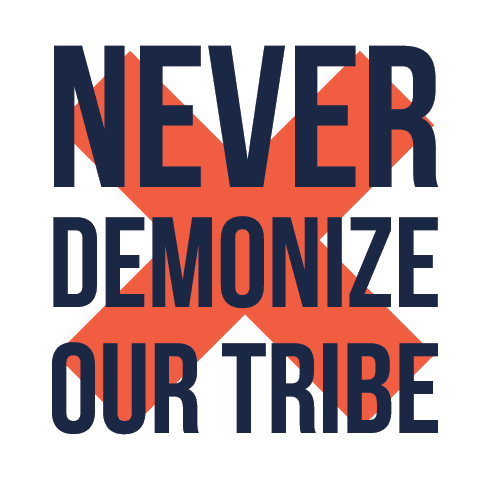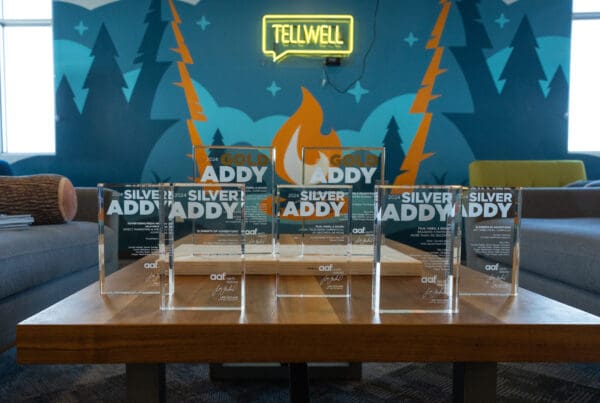If you’ve been with Tellwell from the beginning (or if you’ve spent more than five minutes with any of us), you know we talk a LOT about our Tribe. Our Tribe are the businesses, organizations, and individuals we serve; they are the reason we come to work everyday. And we’re pretty selective about who we let in. We don’t just take on any potential client with a budget who walks through our door; we only partner with people and organizations whose work, mission, and values we truly believe in.
We are proud of our Tribe. But I’m going to let you in on a little secret: working with others is really freakin’ hard.
No matter how complementary we are in our values, we will not 100% agree with every member of our Tribe 100% of the time. Someone will have a different vision for a shot, or suggest an edit to a sentence that we thought was pure poetry. Sometimes, if someone is having a difficult day or struggling with something completely unrelated to the project at hand, they may say something in a harsher tone than they would have used otherwise—and it’s hard not to take that tone personally.
For these moments, we have a rule:
Never Demonize Our Tribe
“Never Demonize our Tribe” is one of the eight Core Norms that dictate why and how we do what we do at Tellwell (learn more about our Core Norms here). We have decided to share one Core Norm with you a month, complete with examples of how we live out these norms on a daily basis. We hope that sharing these norms with you will not only hold us accountable but inspire you to consider why you do what you do.

This Core Norm is a product of our founder Max’s previous workplace experiences. While working in the healthcare and software development fields, he noticed a troubling trend: that no matter the situation, the marketing team was always right. Anyone who disagreed was laughed at or viewed as less-than, even if they were a doctor or a department head. This attitude created a common “enemy,” someone to band against—giving the marketing team a reason to band together. Max noticed himself participating in the toxicity, and when we started his own business, pledged that he would do things differently.
We’re all human, and when someone says or does something that frustrates us, our first instinct is often to complain to the nearest person.
“Can you BELIEVE she didn’t like that ending?! It’s perfect!”
“I spent HOURS on that animation, I don’t have time to change it! What do they know, anyway?!”
“Well if so-and-so would have just communicated this to me sooner, it wouldn’t even BE an issue!”
While venting to our neighbor may make us feel better for a few moments, comments like these won’t do us any good in the long run. Take it from Riley, our wonderful Content Strategist, who said: “Never trash the Tribe. Respect the work, thoughts, and opinions of the Tribe regardless of whether you think you know better or not. We are here to serve them, not ourselves and our egos.”
”We’re all human, and when someone says or does something that frustrates us, our first instinct is often to complain to the nearest person.

Tellwell + Choice Bank ?
Complaining fosters a negative environment that will only continue to grow. Even if they never hear the words we say, when we speak negatively about our Tribe, they can feel it. Travis Bradberry, co-author of Emotional Intelligence 2.0 and President at TalentSmart, explains that repeated complaining rewires our brains to make future complaining more likely.
“Over time, you find it’s easier to be negative than to be positive, regardless of what’s happening around you,” Bradberry wrote. “Complaining becomes your default behavior, which changes how people perceive you.”
And as if one person with a bad attitude wasn’t enough, when nine people share roughly 1,200 square feet of office space for eight hours a day, it is bound to rub off on the rest of us. Bradberry continues:
“Since human beings are inherently social, our brains naturally and unconsciously mimic the moods of those around us, particularly people we spend a great deal of time with. This process is called neuronal mirroring, and it’s the basis for our ability to feel empathy. The flip side, however, is that it makes complaining a lot like smoking—you don’t have to do it yourself to suffer the ill effects. You need to be cautious about spending time with people who complain about everything.”
Negativity is CONTAGIOUS (#Science). So how do we, as a team, avoid it?
Not demonizing our Tribe does not mean that we ignore the things that frustrate us or pretend that things are always hunky-dory. It means taking a step back and asking ourselves a few questions. “What am I really frustrated about, anyway?” Chances are, it has more to do with me than with what the client is saying. “How long would it actually take me to make this change they’re asking for?” A few minutes, a couple of hours—but not nearly as long as I assumed in the heat of the moment. “What will I gain by complaining about this?” Nothing but jolt of instant gratification.
At the end of the day, it means reminding ourselves that we should be grateful that we get to do the work we do with the people we do. Even in moments of frustration, this mindset helps us strengthen our relationships with our Tribe. It encourages us to overcome our challenges, rather than wallow in them.

Tellwell + The People Project ?
Are we perfect? Hell no. Do we slip up from time to time? Of course. But we are working every day to foster a culture of positivity and gratitude, rather than complaints and bitterness. And that, my friends, is what it means to Never Demonize our Tribe.
”At the end of the day, it means reminding ourselves that we should be grateful that we get to do the work we do, with the people we do.
Check in next month to learn about another Tellwell Core Norm!



